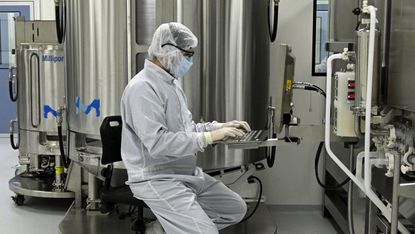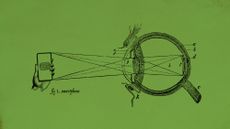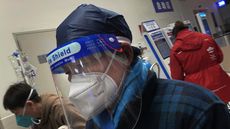England and Germany ‘neck-and-neck’ in coronavirus vaccine race
Teams at Oxford University and BioNTech are competing to produce the first internationally accepted vaccination for Covid-19

The life-and-death sprint to find a drug that can protect us all from Covid-19 is a contest in which there ought to be no losers.
Yet the unprecedented efforts of the world’s scientists and drug companies to create a coronavirus vaccine have culminated in a familiar rivalry, says The Telegraph - “a playoff between teams in England and Germany”.
The first internationally licensed vaccine is expected to emerge either from Oxford University, in partnership with the Anglo-Swedish pharmaceutical company Astra-Zeneca, or from Germany’s BioNTech and its US-based manufacturing partner Pfizer.
Subscribe to The Week
Escape your echo chamber. Get the facts behind the news, plus analysis from multiple perspectives.

Sign up for The Week's Free Newsletters
From our morning news briefing to a weekly Good News Newsletter, get the best of The Week delivered directly to your inbox.
From our morning news briefing to a weekly Good News Newsletter, get the best of The Week delivered directly to your inbox.
“Both products have completed successful phase one and two trials, with data suggesting they produced a ‘robust’ immune response - antibodies and T-cells - in volunteers after two doses,” the newspaper reports.
Scores of other potential vaccines are also under development, and in an unconventional move, two have been approved for use in their home countries before undergoing large-scale phase three trials.
Russia is planning to start mass vaccinations in October using a drug created by the Moscow-based Gameleya laboratory, while China will give soldiers a vaccine developed by medical lab CanSino and military researchers.
However, neither the Russian nor Chinese vaccine is likely to gain international acceptance without phase-three clinical trial results to reassure public health officials.
“Russia has released no scientific data as to the safety and effectiveness of its vaccine,” says CNBC.
By contrast, phase three trials of both the BioNTech and Oxford vaccines are well under way, and data from earlier testing has already been published.
“AstraZeneca has indicated they might be able to start delivering emergency vaccines as early as October, depending on the outcome of the studies,” says The New York Times. “Their phase one/two trial revealed that the vaccine was safe, causing no severe side effects.”
Although the German vaccine caused some “moderate side effects such as sleep disturbances and sore arms”, the paper adds, the drug also produced an effective immune response.
Both vaccines are likely to require two doses, according to The Telegraph, and “how long any protective effect will last” remains “unclear”.
Create an account with the same email registered to your subscription to unlock access.
Sign up for Today's Best Articles in your inbox
A free daily email with the biggest news stories of the day – and the best features from TheWeek.com
Holden Frith is The Week’s digital director. He also makes regular appearances on “The Week Unwrapped”, speaking about subjects as diverse as vaccine development and bionic bomb-sniffing locusts. He joined The Week in 2013, spending five years editing the magazine’s website. Before that, he was deputy digital editor at The Sunday Times. He has also been TheTimes.co.uk’s technology editor and the launch editor of Wired magazine’s UK website. Holden has worked in journalism for nearly two decades, having started his professional career while completing an English literature degree at Cambridge University. He followed that with a master’s degree in journalism from Northwestern University in Chicago. A keen photographer, he also writes travel features whenever he gets the chance.
-
 'Good riddance to the televised presidential debate'
'Good riddance to the televised presidential debate'Instant Opinion Opinion, comment and editorials of the day
By Harold Maass, The Week US Published
-
 Caitlin Clark the No. 1 pick in bullish WNBA Draft
Caitlin Clark the No. 1 pick in bullish WNBA DraftSpeed Read As expected, she went to the Indiana Fever
By Peter Weber, The Week US Published
-
 Today's political cartoons - April 16, 2024
Today's political cartoons - April 16, 2024Cartoons Tuesday's cartoons - sleepyhead, little people, and more
By The Week US Published
-
 Covid four years on: have we got over the pandemic?
Covid four years on: have we got over the pandemic?Today's Big Question Brits suffering from both lockdown nostalgia and collective trauma that refuses to go away
By Chas Newkey-Burden, The Week UK Published
-
 The hollow classroom
The hollow classroomOpinion Remote school let kids down. It will take much more than extra tutoring for kids to recover.
By Mark Gimein Published
-
 Excess screen time is making children only see what is in front of them
Excess screen time is making children only see what is in front of themUnder the radar The future is looking blurry. And very nearsighted.
By Devika Rao, The Week US Published
-
 Covid-19: what to know about UK's new Juno and Pirola variants
Covid-19: what to know about UK's new Juno and Pirola variantsin depth Rapidly spreading new JN.1 strain is 'yet another reminder that the pandemic is far from over'
By Arion McNicoll, The Week UK Published
-
 Long-term respiratory illness is here to stay
Long-term respiratory illness is here to stayThe Explainer Covid is not the only disease with a long version
By Devika Rao, The Week US Published
-
 Covid inquiry: the most important questions for Boris Johnson
Covid inquiry: the most important questions for Boris JohnsonTalking Point Former PM has faced weeks of heavy criticism from former colleagues at the public hearing
By The Week Staff Published
-
 China's pneumonia cases: should we be worried?
China's pneumonia cases: should we be worried?The Explainer Experts warn against pushing 'pandemic panic button' following outbreak of respiratory illness
By Keumars Afifi-Sabet, The Week UK Published
-
 Vallance diaries: Boris Johnson 'bamboozled' by Covid science
Vallance diaries: Boris Johnson 'bamboozled' by Covid scienceSpeed Read Then PM struggled to get his head around key terms and stats, chief scientific advisor claims
By The Week UK Published